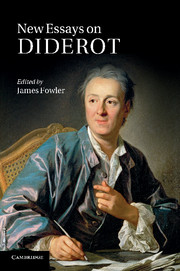Book contents
- Frontmatter
- Contents
- Notes on contributors
- Acknowledgements
- List of abbreviations
- Introduction
- PART I DIDEROT THE PHILOSOPHE
- PART II NOVELS
- 7 Les Bijoux indiscrets: transition or translation?
- 8 Jacques le fataliste et son maître: finding myself in the work of another
- 9 La Religieuse: Diderot's ‘Richardsonian’ novel
- PART III DIALOGUES
- PART IV PLAYS AND DRAMATIC THEORY
- PART V MUSIC, PERFORMANCE, AESTHETICS
- Select bibliography
- Index
9 - La Religieuse: Diderot's ‘Richardsonian’ novel
Published online by Cambridge University Press: 11 April 2011
- Frontmatter
- Contents
- Notes on contributors
- Acknowledgements
- List of abbreviations
- Introduction
- PART I DIDEROT THE PHILOSOPHE
- PART II NOVELS
- 7 Les Bijoux indiscrets: transition or translation?
- 8 Jacques le fataliste et son maître: finding myself in the work of another
- 9 La Religieuse: Diderot's ‘Richardsonian’ novel
- PART III DIALOGUES
- PART IV PLAYS AND DRAMATIC THEORY
- PART V MUSIC, PERFORMANCE, AESTHETICS
- Select bibliography
- Index
Summary
The pioneering critic Georges May characterises La Religieuse as Diderot's novel ‘à la manière de Richardson’ (‘in the manner of Richardson’); and in many respects it would be perverse to argue with this assessment. Richardson's Clarissa in particular became a source of plot elements, characters and themes without which La Religieuse would surely have been a very different work. In some ways, Diderot was bound to love the English author because he confirmed several of his own tendencies. The philosophe's writing before 1760 shows that he was drawn to the expressive possibilities of dialogue and gesture; and his theory and practice of the drame, developed in the 1750s, offer points of comparison with the middle-class, didactic aspects of Richardson. At the same time, mixed success had met his plays Le Fils naturel (The Natural Son) and Le Père de famille (The Father), in which base motives are banished by an all-conquering virtue. For Diderot, Clarissa proved that novels (if not plays) might morally improve their readers without showing virtue triumphant. Or as the philosophe puts it in the Éloge de Richardson: ‘Qui est-ce qui voudrait être Lovelace avec tous ses avantages? Qui est-ce qui ne voudrait pas être Clarisse, malgré toutes ses infortunes?’ (‘Who would want to be Lovelace, for all his advantages? Who would not want to be Clarissa, in spite of all her misfortunes?’)
- Type
- Chapter
- Information
- New Essays on Diderot , pp. 127 - 138Publisher: Cambridge University PressPrint publication year: 2011
- 1
- Cited by

